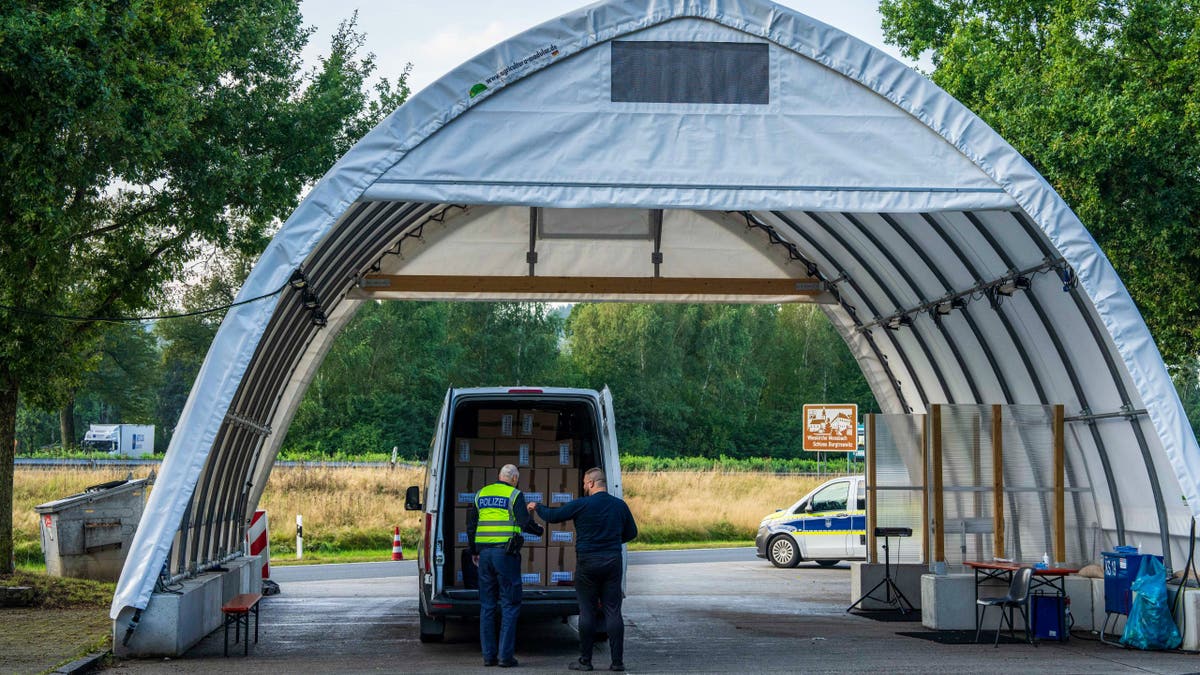INTERNACIONAL
Estados Unidos: la FED afloja la guerra contra la inflación y anunció una baja de las tasas de interés de 0,5 puntos

INTERNACIONAL
Germany clamps down on illegal immigrants as country forced to rethink policies amid voter anger

Germany has tightened control at all land border crossings in an effort to clamp down on immigration issues amid panic across the European continent over extremism.
«Like the United States under dangerously liberal Kamala, the world is learning that wide open borders mixed with soft-on-crime policies is a recipe for criminals and terrorists to unleash rampant and violent crime in our communities,» RNC spokesperson Taylor Rogers told Fox News Digital.
The arrival of «irregular migrants,» which is an alternative term for illegal immigration, has dropped across Europe this year by around 36%, but the concerns over the impact of such immigration remains a chief concern for the European Union as a whole, according to the bloc’s migration agency Frontex.
The bloc signed a series of migration agreements with Tunisia, Egypt and Lebanon, and the members worked out an agreement called the «Pact on Migration and Asylum,» finalized in the summer, according to French outlet Le Monde.
NEARLY 530,000 MIGRANTS CAME TO US ‘LEGALLY,’ PAROLED INTO US UNDER CONTROVERSIAL BIDEN PROGRAM: CBP
Germany has taken its own initiative to empower authorities to reject migrants directly at its borders – a controversial decision for a region that allows free movement between its member states. The new measures will kick in on Sept. 16 for a trial run of six months, German Interior Minister Nancy Faeser announced this week.
A temporary extension of border controls to all of Germany’s nine land frontiers took effect on Monday, part of an enhanced effort to tackle irregular migration and people smuggling that has irritated some of its neighbors. (Milan Jaros/Bloomberg via Getty Images)
«We are strengthening internal security and continuing our hard line against irregular migration,» Faeser said.
TOP HOUSE COMMITTEE RAMPS UP PRESSURE TO OBTAIN ‘IMPORTANT’ DOCS ON HARRIS’ ROLE IN BORDER CRISIS

German police stand in front of pro-Palestinian protesters in front of Humboldt University in Berlin. (Photo by Michele Tantussi/Getty Images)
Germany has experienced a surge of migrants from the war-torn Middle East and parts of North Africa. German authorities have blamed small increases in crime on the increased levels of migration. Foreigners committed around 41% of crimes in Germany in 2023 while making up 15% of the population.

A police officer performs a spot-check on a vehicle at the Czech Republic-Germany border in Ulrichsberg, Germany, on Tuesday, Sept. 17, 2024. (Milan Jaros/Bloomberg via Getty Images)
The issue has pushed Germans to hand a far-right party its first state election win in decades. The election occurred just days after a Syrian immigrant killed three people in a stabbing spree in the country, with ISIS claiming responsibility for the attack.
SEN. BLACKBURN SLAMS MAYORKAS OVER BORDER CRISIS: LIST OF FAILURES CONTINUES TO GROW
Similar extreme Islamist attacks across Europe have revived fears of immigration and prompted strong wins for right-wing parties in individual countries and in the European Parliament itself.

Members of a special police unit escort a man suspected to be responsible for the Solingen knife attack from a helicopter to the Office of the Federal Prosecutor in Karlsruhe, Germany, on Aug. 25, 2024. Police arrested the suspect in a raid at a hostel for asylum seekers on August 24, 2024, not far from the scene of the random attack during festivities to celebrate the 650th anniversary of Solingen, western Germany. Authorities said that the Syrian man had given himself up and confessed to killing three people and wounding several others in a knife rampage at a street festival. (THOMAS KIENZLE/AFP via Getty Images)
Germany has handled the brunt of this movement, accepting over a million people fleeing from countries such as Syria during the 2015/16 migrant crisis, according to Reuters.
However, these new measures, due to the free movement in the European Union, pose a challenge as it will potentially shift the burden onto Germany’s neighbors.
CLICK HERE TO GET THE FOX NEWS APP
Austrian Interior Minister Gerhard Karner told German outlet Bild that «there’s no room for maneuver» to accept migrants rejected at the German border. As the largest country in Central Europe, Germany borders on Denmark, Belgium, Luxembourg, France, Switzerland, Austria, the Czech Republic and Poland.
Reuters contributed to this report.
-
POLITICA3 días ago
A fin de mes se definiría la condena a Cristina Kirchner por la causa Vialidad
-
POLITICA2 días ago
Luis Caputo cruzó a gobernadores e intendentes K: “Siguen subiendo impuestos para perjudicar al país”
-
ECONOMIA2 días ago
En una señal al mercado, el Gobierno ya compró los dólares para pagar los intereses de deuda de enero
-
POLITICA2 días ago
Jubilados protestan en contra de la celebración de Javier Milei por el veto a la reforma jubilatoria
-
POLITICA1 día ago
Javier Milei celebró que «la inflación está bajando» pese a los aumentos de las tarifas
-
POLITICA2 días ago
Paula Oliveto: “Es preocupante ver cómo la clase media y los sectores más vulnerables están sufriendo”





























